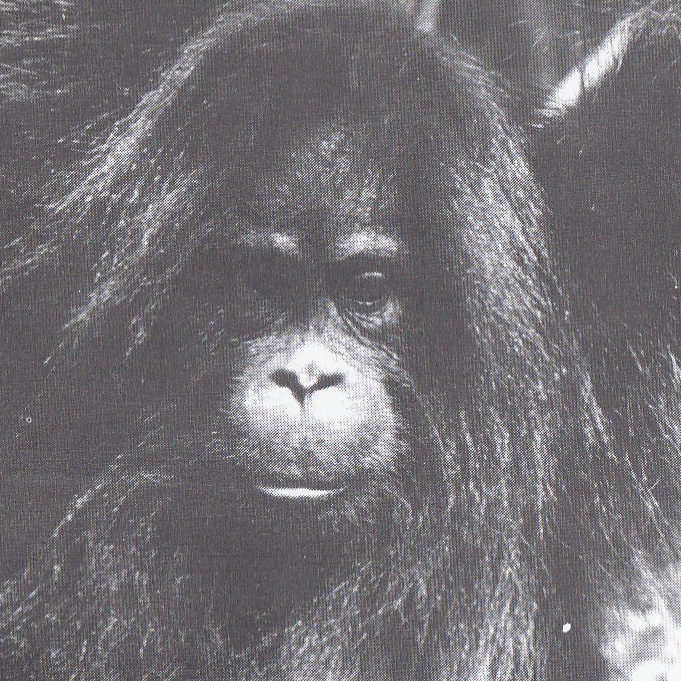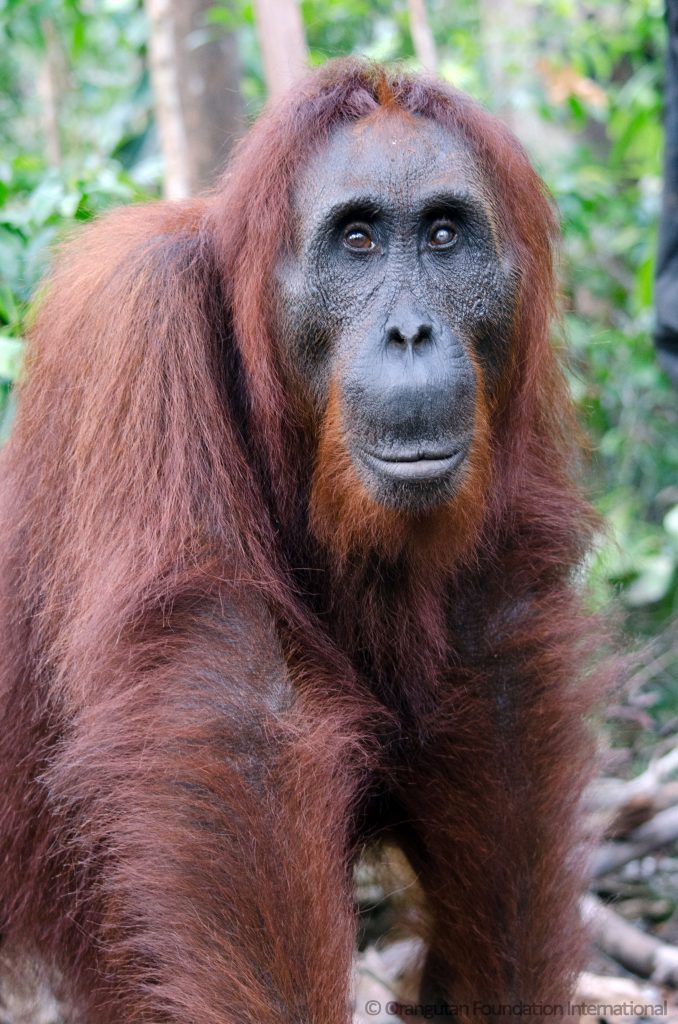
Akmad impacted me not only because she was the first orangutan female whom we rescued but also because of her very genteel and serene nature. She was a wild orangutan who had not been kept in captivity for very long. She was also a local girl in the sense that she was captured by illegal loggers within the Sekonyer River area. Akmad was much older than the typical infant orangutan whom we usually found in captivity. She was on the verge of adolescence and probably had already occasionally traveled some distance from her mother. Hopefully, her mother was not killed when Akmad was captured. Akmad had been captured so close to our study area that perhaps her mother’s home range had extended as far as Camp Leakey. In fact, Akmad could hardly be distinguished by her appearance from the local wild orangutan females in our study area.
Akmad was an extraordinary orangutan. For a long time, she remained the dominant orangutan female in the vicinity of Camp Leakey. She never really pushed her dominance; she was not a bully in any way, shape, or form. The way she moved, the way she acted, the way she behaved, she was always genteel. She was always an aristocrat among the orangutans. Perhaps it was because she had grown up wild. Her calmness and serenity were tied to the strong positive confidence of a naturally born Brahmin.
The impact that she had on me was very deep and permeated my whole understanding of what an orangutan actually was. I became Akmad’s mother. We developed such a relationship that once she herself became a mother, I could touch her infants without Akmad ever objecting. If other people touched her infants, she usually became aggressive. The insight that she provided into the orangutan soul penetrated into my own soul. I came to realize that even though they are very closely related to humans, orangutans live in their own reality.
Although Akmad spent much time with me, sometimes even sleeping in my hammock or on my mattress with me, she never really entered or wanted to enter the human world. She never used human tools in the way some ex-captive orangutans did. She never behaved like she was an ex-captive. Her wildness remained with her. She started wild and stayed wild. But her wildness was so genuine that it still allowed her to become friends with me. We were of different species but totally equal in our relationship despite the fact that she lived in Nature and I lived mostly outside of it.

The conditions at Camp Leakey were unusual. Rod and I were alone most of the time. A local assistant worked for us and lived in camp with his wife and children. The family stayed on the other side of Camp Leakey in their own hut. At that time, Camp Leakey consisted of two decrepit bark-walled thatch-roofed huts separated by about a hundred meters. These huts were relics of illegal loggers whom officials of the Forestry Department had chased out of the area before our arrival. If visitors came in the morning or evening, like Akmad sometimes would do, they would find us alone. During the day, Rod and I would be in the forest. Those conditions enabled Akmad and me to become friends. She allowed me to see the true essence of Orangutan. Even though we humans were foreign to her, we were not totally strangers. She had some understanding of us due to her brief time in captivity. She was smart so she was ambivalent about humans. Unfortunately, however, the greater part of her understanding was that humans could be dangerous and unpredictable, and that most humans, particularly men, needed to be avoided. She didn’t want anything to do with humans although she made an exception for me. In the early days when local people, especially men, occasionally visited our little camp Akmad would noiselessly climb up into the roof rafters, silently slip through the thatch roof without even being noticed and return to the forest.
As I write this, what saddens me is that Akmad recently disappeared. Before she disappeared, she came back once to Camp Leakey which she had not done in many years. She was already probably blind in one eye. I was not in Borneo at the time, but I saw the photographs that Camp Leakey staff had taken. Akmad briefly walked around camp and then she went back into the forest never to return. At that point, I had known her for almost 50 years. She was probably in her mid-50s when she died. Perhaps she had visited Camp Leakey to say goodbye. Once you have formed a true bond with an orangutan that bond lasts forever. Orangutans might not indicate their relationships the way human beings do. If they encounter you after not seeing you for a long time, they might look at you and for thirty seconds your eyes will lock. That is the greatest acknowledgement an orangutan might give you to indicate that they have a relationship with you. Then, after those few seconds, they will look away and return to their own reality.


